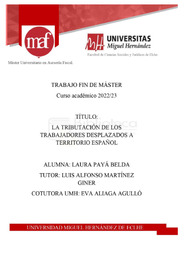Por favor, use este identificador para citar o enlazar este ítem:
https://hdl.handle.net/11000/29913Registro completo de metadatos
| Campo DC | Valor | Lengua/Idioma |
|---|---|---|
| dc.contributor.advisor | MARTINEZ GINER, LUIS ALFONSO | - |
| dc.contributor.advisor | Aliaga Agullo, Eva | - |
| dc.contributor.author | Payá Belda, Laura | - |
| dc.contributor.other | Departamentos de la UMH::Estudios Económicos y Financieros | es_ES |
| dc.date.accessioned | 2023-10-30T17:28:58Z | - |
| dc.date.available | 2023-10-30T17:28:58Z | - |
| dc.date.created | 2023 | - |
| dc.identifier.uri | https://hdl.handle.net/11000/29913 | - |
| dc.description.abstract | En el presente trabajo se estudia, en una primera parte, la forma de tributación que España tienen recogida en su legislación para los trabajadores desplazados a territorio español, contemplada principalmente en el artículo 93 de la LIRPF. Así como las condiciones bajo las cuales se aplica el régimen especial, exponiendo las recientes modificaciones publicadas con efectos en el presente ejercicio 2023, y su obligaciones formales, previas y posteriores a la aplicación de este. En una segunda parte, se estudiará la tributación de las rentas obtenidas por residente en España por trabajos realizados efectivamente en el extranjero. Nuevamente se expondrán tanto los requisitos que se exigen para poder, en este caso, aplicar la exención contemplada en el artículo 7 apartado p) de la LIRPF o en su lugar el régimen de excesos contemplado en el artículo 9.A.3.b del RIRPF. Además, debido a la importancia que tienen los CDI en la tributación de las rentas obtenidas de países distintos al de residencia fiscal del contribuyente se dedicará un apartado en cada uno de los regímenes para ver cómo intervienen los convenios en la tributación de las rentas referidas en cada parte del presente trabajo. | es_ES |
| dc.description.abstract | This paper examines, in a first part, the form of taxation that Spain has included in its legislation for workers posted to Spanish territory, mainly contemplated in article 93 of the LIRPF. As well as the conditions under which the special regime is applied, exposing the recent modifications published with effect in the current year 2023, and its formal obligations, before and after the application of this. In a second part, the taxation of income obtained by residents in Spain for work carried out abroad will be studied. Again, both the requirements that are required to be able, in this case, to apply the exemption contemplated in article 7 paragraph p) of the LIRPF or instead the regime of excesses contemplated in article 9.A.3.b of the RIRPF will be exposed. In addition, due to the importance of CDIs in the taxation of income obtained from countries other than the taxpayer's tax residence, a section will be dedicated in each of the regimes to see how the agreements intervene in the taxation of the income referred to in each part of this work. | es_ES |
| dc.format | application/pdf | es_ES |
| dc.format.extent | 74 | es_ES |
| dc.language.iso | spa | es_ES |
| dc.publisher | Universidad Miguel Hernández de Elche | es_ES |
| dc.rights | info:eu-repo/semantics/openAccess | es_ES |
| dc.rights | Attribution-NonCommercial-NoDerivatives 4.0 Internacional | * |
| dc.rights.uri | http://creativecommons.org/licenses/by-nc-nd/4.0/ | * |
| dc.subject | residencia fiscal en TE | es_ES |
| dc.subject | no residentes | es_ES |
| dc.subject | trabajadores desplazados | es_ES |
| dc.subject | rendimientos de trabajo | es_ES |
| dc.subject | exención | es_ES |
| dc.subject.other | CDU::3 - Ciencias sociales::33 - Economía | es_ES |
| dc.title | La tributación de los trabajadores desplazados a territorio español | es_ES |
| dc.type | info:eu-repo/semantics/masterThesis | es_ES |

Ver/Abrir:
01 TFM DE PAYA BELDA LAURA.pdf
3,73 MB
Adobe PDF
Compartir:
 La licencia se describe como: Atribución-NonComercial-NoDerivada 4.0 Internacional.
La licencia se describe como: Atribución-NonComercial-NoDerivada 4.0 Internacional.
.png)